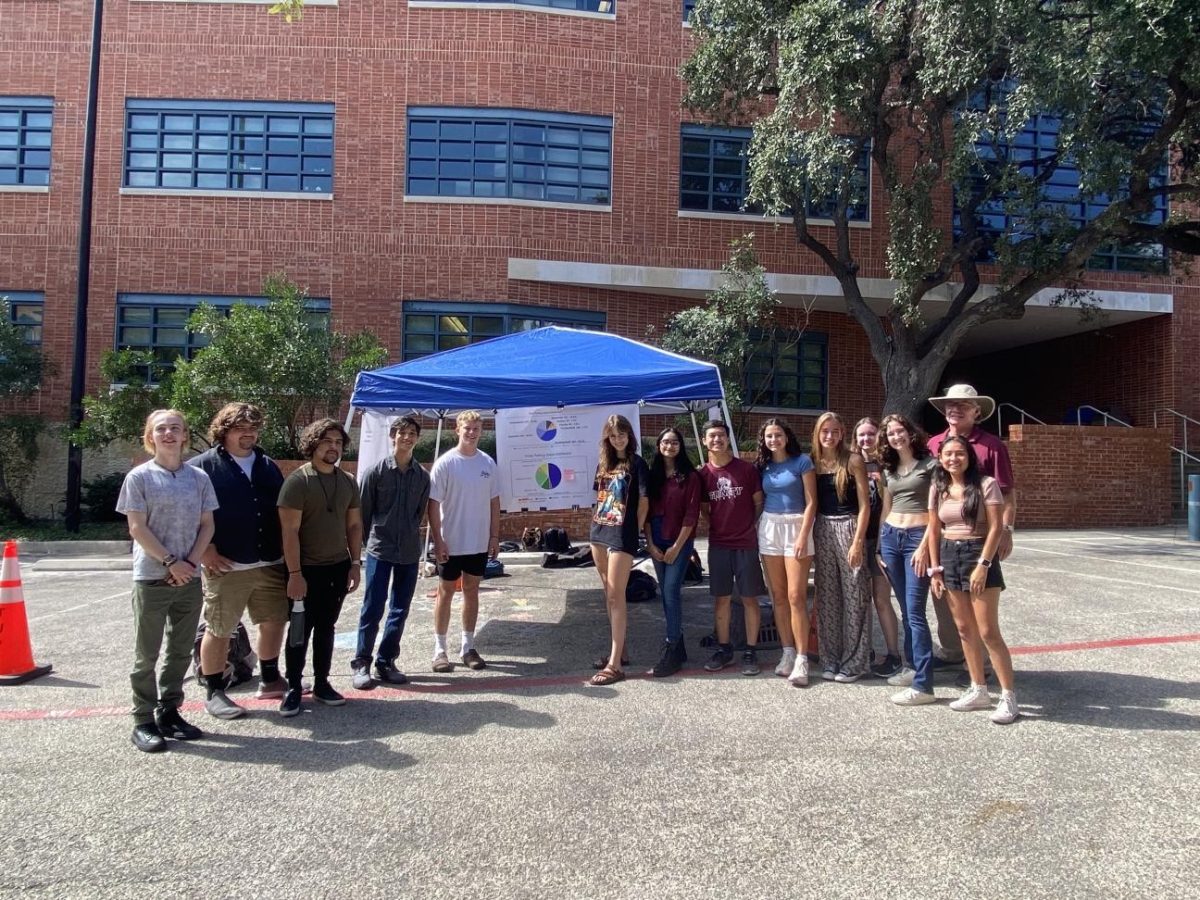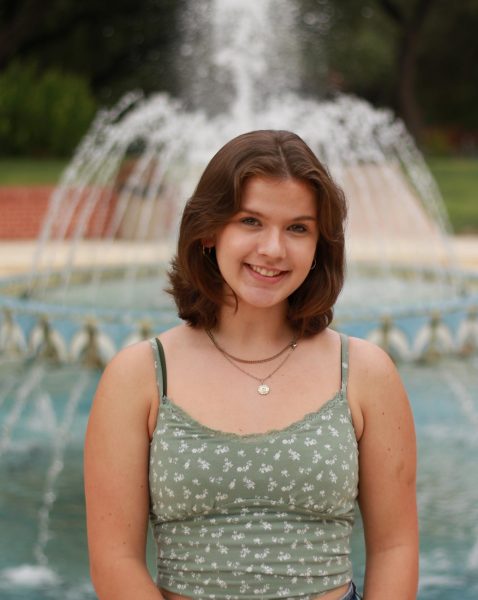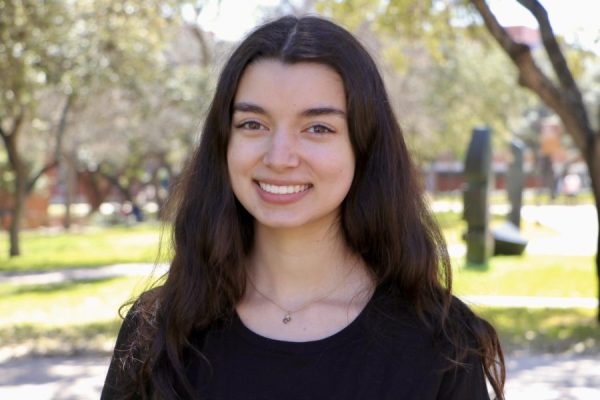Climate Changed, the first-year experience (FYE) class, participated in the global event, “PARK(ing) Day,” by occupying parking lots with informational stands, art and other creative ways to highlight environmental issues. The organizers and participants of this movement sought to spread awareness of the negative impact of the substantial use of parking lots in hopes of minimizing the use of personal vehicles and parking spot usage to increase open spaces in urban areas.
The Climate Changed FYE students occupied three parking spots in various lots around campus on Sept. 15: one next to Parker Chapel, one next to Northrup Hall and one next to Dicke Hall. In the parking lots, they set up informational tents to educate passersby on campus.
PARK(ing) Day at Trinity was more about assessing whether change is necessary than directly making a change.
Greg Hazleton, one of the Climate Changed FYE professors, remarked on his students’ work.
“One of the things we are learning is that when we look at data, we don’t want to jump to the conclusion of change, but just to see what the data shows,” Hazleton said. “We’ve had discussions about how surprising some of this data is. … I’ll be interested to see, knowing what the students put together and how the data shows what the parking habits are if parking changes are made.”
The Climate Changed students came to understand the impact of parking lots worldwide. According to their research, parking lots cover 2%-5% of land across the United States, and in many cities, parking lots cover about 40% of land. 91.7% percent of households own at least one motor vehicle. At least 45% of Americans don’t have access to public transportation, and many Americans don’t understand how to use local public transportation in the first place.
Public transportation can be stressful and unpredictable, thus many people choose to avoid public transport instead of taking advantage of its positive environmental impact. Ashlyn Gillespie, first-year environmental studies and communication double-major and Climate Changed FYE student, has faced this issue of complicated public transport.
“A lot of us don’t have cars and me personally, I don’t know the bus system and I’m not comfortable with the bus system. I’m not from San Antonio,” Gillespie said. “I’ve been told it takes forever to get everywhere by bus, and biking is not really an option here either.”
Madeline Reed, first-year computer science major and Climate Changed FYE student, expressed why she chose Climate Changed and why she feels so strongly about helping the environment.
“I chose Climate Changed because I’ve had a love for the natural world around us ever since I was little, and as I got older, I realized how big of an issue climate change is and how to do something about it,” Reed said. “I knew when I saw this FYE I wanted to take it not only to learn more about the issue at hand but what can we do about it.”
Trinity students make up a small part of the larger, globally recognized environmental movement. PARK(ing) Day evolved into a full-scale activist movement from an art project. In 2005, members of Rebar, a San Francisco art and design studio, turned a metered parking space into a miniature park with grass, a 15-foot-tall tree and a bench. Rebar took an activist approach toward displaying the need for more greenery and open spaces in densely urban areas to show the possibility that within a short period, anyone could make a difference for the environment.
Since then, PARK(ing) Day has turned into a global resource for other movements such as issuing water rights, labor equity, marriage equality, health care and, more locally, saving pollinators.
Only 10 minutes away from campus on Houston Street, San Antonio residents celebrated PARK(ing) Day with art in occupied parking spots that aimed at the need to create healthy places for birds, bats, bees, butterflies and other insects whose numbers are quickly dwindling.
This movement started small in San Francisco, yet managed to grasp the attention of environmental activists across the world. Each year, more and more participants get involved and take unique angles to spread awareness about environmental issues.
“I hope this movement will affect parking globally. I think there are interesting paradoxes about parking in cities that could be an important part of rethinking transportation in urban areas,” Hazleton said. “We hopefully might be able to transition more quickly to more public transportation, and hopefully electric public transportation rather than fossil fuels.”
Climate Changed takes over Trinity’s parking spots
FYE class joins PARK(ing) Day movement to show the environmental impact of parking lots
Eve Slemp
Climate Changed, the first-year experience (FYE) class, participated in the global event, “PARK(ing) Day,” by occupying parking lots with informational stands, art and other creative ways to highlight environmental issues. The organizers and participants of this movement sought to spread awareness of the negative impact of the substantial use of parking lots in hopes of minimizing the use of personal vehicles and parking spot usage to increase open spaces in urban areas.
The Climate Changed FYE students occupied three parking spots in various lots around campus on Sept. 15: one next to Parker Chapel, one next to Northrup Hall and one next to Dicke Hall. In the parking lots, they set up informational tents to educate passersby on campus.
PARK(ing) Day at Trinity was more about assessing whether change is necessary than directly making a change.
Greg Hazleton, one of the Climate Changed FYE professors, remarked on his students’ work.
“One of the things we are learning is that when we look at data, we don’t want to jump to the conclusion of change, but just to see what the data shows,” Hazleton said. “We’ve had discussions about how surprising some of this data is. … I’ll be interested to see, knowing what the students put together and how the data shows what the parking habits are if parking changes are made.”
The Climate Changed students came to understand the impact of parking lots worldwide. According to their research, parking lots cover 2%- 5% of land across the United States, and in many cities, parking lots cover about 40% of land. 91.7% percent of households own at least one motor vehicle. At least 45% of Americans don’t have access to public transportation, and many Americans don’t understand how to use local public transportation in the first place.
Public transportation can be stressful and unpredictable, thus many people choose to avoid public transport instead of taking advantage of its positive environmental impact. Ashlyn Gillespie, first-year environmental studies and communications double-major and Climate Changed FYE student, has faced this issue of complicated public transport.
“A lot of us don’t have cars and me personally, I don’t know the bus system and I’m not comfortable with the bus system. I’m not from San Antonio,” Gillespie said. “I’ve been told it takes forever to get everywhere by bus, and biking is not really an option here either.”
Madeline Reed, first-year computer science major and Climate Changed FYE student, expressed why she chose Climate Changed and why she feels so strongly about helping the environment.
“I chose Climate Changed because I’ve had a love for the natural world around us ever since I was little, and as I got older, I realized how big of an issue climate change is and how to do something about it,” Reed said. “I knew when I saw this FYE I wanted to take it not only to learn more about the issue at hand but what can we do about it.”
Trinity students make up a small part of the larger, globally recognized environmental movement. PARK(ing) Day evolved into a full-scale activist movement from an art project. In 2005, members of Rebar, a San Francisco art and design studio, turned a metered parking space into a miniature park with grass, a 15-foot-tall tree and a bench. Rebar took an activist approach toward displaying the need for more greenery and open spaces in densely urban areas to show the possibility that within a short period, anyone could make a difference for the environment.
Since then, PARK(ing) Day has turned into a global resource for other movements such as issuing water rights, labor equity, marriage equality, health care and — more locally — saving pollinators.
Only 10 minutes away from campus on Houston Street, San Antonio residents celebrated PARK(ing) Day with art in occupied parking spots aimed at the need to create healthy places for birds, bats, bees, butterflies and other insects whose numbers are quickly dwindling.
This movement started small in San Francisco, yet managed to grasp the attention of environmental activists across the world. Each year, more and more participants get involved and take unique angles to spread awareness about environmental issues.
“I hope this movement will affect parking globally. I think there are interesting paradoxes about parking in cities that could be an important part of rethinking transportation in urban areas,” Hazleton said. “We hopefully might be able to transition more quickly to more public transportation, and hopefully electric public transportation rather than fossil fuels.”









